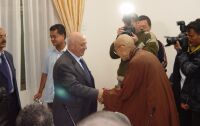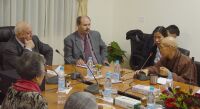 Master Sheng Yen & WCRL in Israel: Bridging Differences through Religion Master Sheng Yen & WCRL in Israel: Bridging Differences through Religion
12/30/2003
 The World Council of Religious Leaders (WCRL) delegation of about 20 representatives traveled to Israel for exploratory meetings with Israeli and Palestinian religious and political leaders in an effort to convey the message for peaceful interface, and attempting to initiate a bridging of differences between the two opposing sides through religion in December
9 - 15, 2003. The World Council of Religious Leaders (WCRL) delegation of about 20 representatives traveled to Israel for exploratory meetings with Israeli and Palestinian religious and political leaders in an effort to convey the message for peaceful interface, and attempting to initiate a bridging of differences between the two opposing sides through religion in December
9 - 15, 2003.
Witnessing the suffering of the Israelis and Palestinians in a volatile and chaotic environment and their yearning for peace and stability, Master Sheng Yen, a proponent of peace, through the course of several key meetings and dialogues, presented recommendations on reconciliation and peace making that have been positively and sincerely accepted by both the Israelis and Palestinians.
Traveling into restricted Palestinian occupied territories of Israel, the WCRL delegation met with Palestinian Prime Minister Ahmed
Qureia on December 11. During the meeting, Master Sheng Yen, a member of the WCRL Board, pointed out that people on the "Holy Land" had endured a history of suffering from conflicts and upheavals. In order to help these people, religious leaders should engage in the role of bridging differences through the promotion of the understanding between the two sides. The peace is yearned by all in the world can only arise from the inner minds of people. However, raison d'Ítre manifested from politician's selfishness and insecurity had distorted dreams for peace into nothing but a meaningless
slogan.
Meetings conducted with religious leaders of Judaism, Christianity and other religions in Jerusalem revealed many opinions with regards to peaceful coexistence and interaction. The Jewish religious leaders explained:
"in the eyes of the Jewish people, the 'Holy Land' is a gift from God; an undisputable fact especially to Jewish settlers in the developing area..." But, Master Sheng Yen reasoned, in his view, whenever a passage in a holy scripture is found to be in conflict with human peace, it should be given a new interpretation. A Jewish religious leader concurred that the possibility of reinterpretation of holy scriptures might lead to the resolution, and, in the interest of saving humanity, there should be new interpretations to the words in the holy scripture.
Therefore, Master Sheng Yen underlined that religion itself, in principle, presents no problem. Political leaders ought to, he implored, pay attention to the voices of religious leaders. The master concluded by giving his blessings for the Israeli and Palestinian people and wishing that they would be able to come to a resolution for peace so that they can live lives without terror.
 Mr. Qureia applauded enthusiastically to the master's earnest suggestions, and was reported to have remarked after the meeting of his hopes to see the master's suggestions be brought to fruition positively. Mr. Qureia applauded enthusiastically to the master's earnest suggestions, and was reported to have remarked after the meeting of his hopes to see the master's suggestions be brought to fruition positively.
At a colloquium at the office of the Israeli prime minister on December 14, Master Sheng Yen again shared his views and suggestions with ranking Israeli officials including Cabinet officials, parliamentary advisers, and government advisors in news, communications and religious affairs. In his dialogue, the master cited his meeting with a Muslim scholar in the U.S. who deemed 'Jihad' (Holy War) as: to defeat one's own evil thoughts. On the other hand, the master had also met a Muslim in Israel who viewed defeating anyone occupying his/her land as 'Jihad', even if it requires force.
But the question remains, which people does the "Holy Land" really belong to? Master Sheng Yen recounted that Buddhism originated from India, and was being prosecuted during the Muslim invasion. However, though a Buddhist, Master Sheng Yen said that he bode no ill will or hatred towards Islam or any Muslims. And as a Buddhist, Master Sheng Yen also concurred that 'Jihad' is to conquer humanity's evilness and selfishness within their own inner minds. Therefore he wishes that the Jews and Christians could extend their hands of friendship towards the Muslims, although the extremists might not waver in their stance in the immediate future, but the rest of the peaceful and loving Muslims would come to gradually transform their views.
 Subsequent to the colloquium, Israeli government dignitaries invited Master Sheng Yen for further private talks in which he introduced the concept of Protecting the Spiritual Environment advocated by the Dharma Drum Mountain in his suggestions towards peace and in calming people's minds. Subsequent to the colloquium, Israeli government dignitaries invited Master Sheng Yen for further private talks in which he introduced the concept of Protecting the Spiritual Environment advocated by the Dharma Drum Mountain in his suggestions towards peace and in calming people's minds.
Prior to departure, Master Sheng Yen presented two words -- wisdom and compassion -- to the people and leaders of Israel and Palestine as keys in the pursuit of peace. The master called for the political leaders of the two opposing sides to use wisdom while searching for resolutions to their differences and practicing compassion in treating all people regardless of their political affiliation or religion so as to not dishearten the peoples living in the "Holy Land."
|
